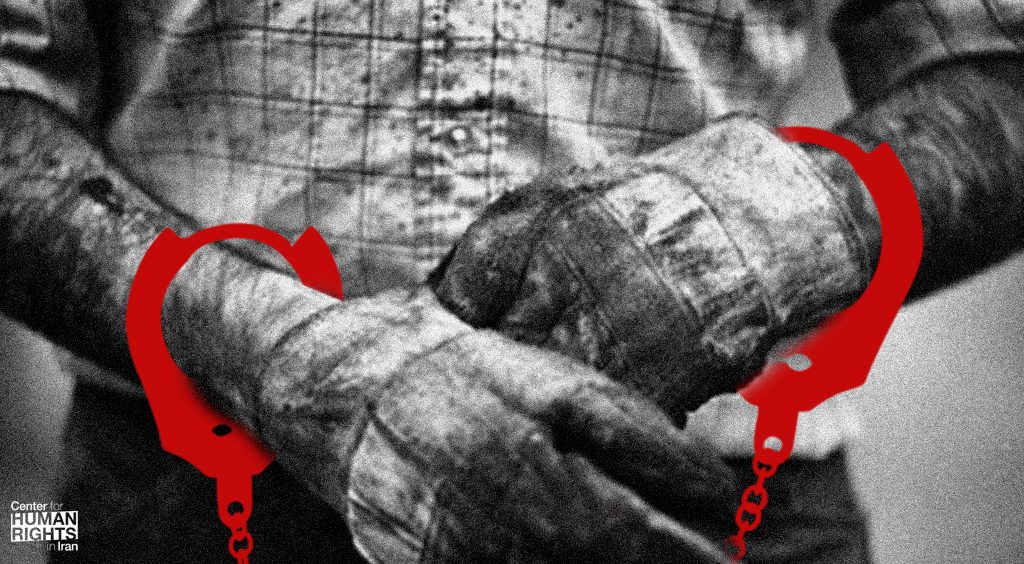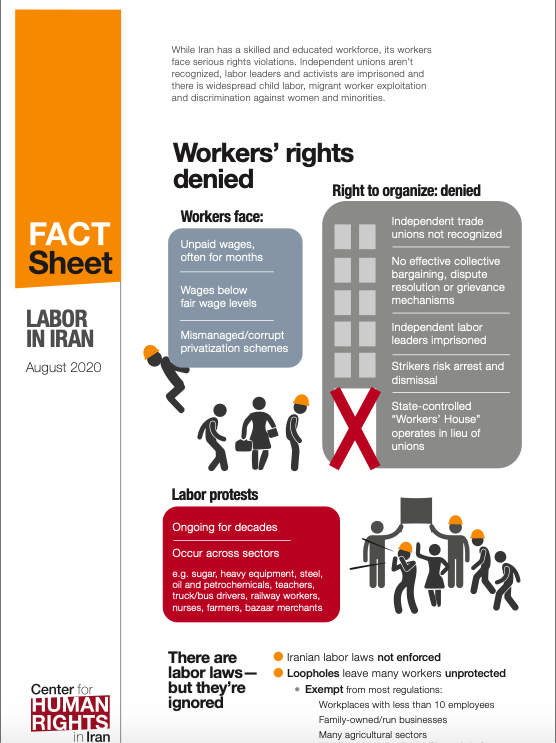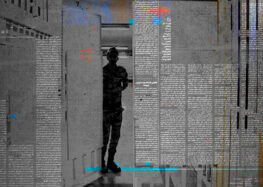Dozens of Labor Activists Detained, Thousands of Workers Threatened as Strikes Roil Iran

ILO Must Speak Out Forcefully Against Islamic Republic’s Abuses Against Labor
Strikers in Iran’s oil, gas and petrochemicals industries are being threatened with firing and labor activists are being rounded up and imprisoned as the Islamic Republic turns its focus to labor in its continued drive to squash peaceful protest across the country.
In the days leading up to International Labor Day on May 1, dozens of labor activists were detained or summoned to court in Tehran, Kurdistan, and Gilan provinces, while striking seasonal contract workers in more than 100 companies in the hydrocarbon sector have been told their employment will be terminated, in violation of Iran’s obligations under both international and domestic law.
These actions follow the state’s violent suppression of protests that swept Iran after the death in state custody of Jina Mahsa Amini for her allegedly improper hijab, in which state security forces killed more than 500 protesters and arrested more than 22,000.
Imprisoning labor activists and firing workers for striking is in direct violation of the International Labor Organization’s (ILO) Fundamental Principles. Iran is a member of the ILO; if these organizations are to have any meaning at all their leaderships must speak out against severe and blatant violations by their members. The Center for Human Rights in Iran (CHRI) urgently calls on the ILO to immediately release a strong and clear statement that the Islamic Republic, an ILO founding member, is in profound violation of its most basic principles, and that as a member of the ILO, Iran is required to guarantee the right to strike.
Striking teachers in Iran, who have also faced unlawful prosecution, called upon the ILO last year to eject Iran as a member, given the severity of its violations of ILO Principles.
Dozens of Labor Activists Arrested Since September 2022 Protests Began
At least 42 labor activists and journalists who cover labor issues have been arrested or summoned to court since the nationwide antigovernment protests that began in September 2022 erupted, according to research by CHRI. (Scroll to the bottom of this article for a list of names.)
The Iranian authorities’ crackdown on Labor Day included the arrest of a prominent teachers’ rights activist and spokesperson for the Iranian Teachers’ Trade Association (ITTA), Mohammad Habibi, whose home was also raided when he was arrested on April 28, 2023. Habibi had only recently been released from prison in February 2023 where he had been held since October 2022.
Habibi was violently re-arrested along with a number of other labor activists, among them Reyhaneh Ansarinejad, Asal Mohammadi, Hirad Pirbodaghi, Anisha Asadollahi, Sarvenaz Ahmadi, Kamyar Fakour, Hassan Ebrahimi, Jaleh Rouhzad and Oldouz Hashemi, all of whom were transferred to Evin Prison in Tehran. Habibi’s wife Khadijeh Pakzamir and labor activist Neda Naji were also detained but released after a few hours.
The arrests were condemned as “systematic brutality” in a joint statement by imprisoned labor activists Reza Shahabi and Hassan Saeidi, both senior members of the Tehran bus drivers’ union, and Keyvan Mohtadi, who are all serving six-year prison sentences at Tehran’s Evin Prison (5 years mandatory) on manufactured national security charges for their peaceful labor activism.
Women and Students’ Groups Express Solidarity with Workers
Labor has long been a bastion of peaceful protest in Iran, and the authorities have cracked down hard on its activists since the September 2022 protests began, as labor has expressed solidarity with the “Women Life Freedom” protest movement that followed Amini’s death. (In February 2023, 20 independent trade unions and civil society organizations in Iran issued a Joint Charter of Basic Demands in solidarity with the “Woman Life Freedom” movement.)
The authorities in Iran are keen to prevent any coalescing of protesting groups in the country, recognizing the greater threat such coordination would present to its repressive capacity. Yet many groups have stepped forward to express their support for the strikers.
In April 2023, a group of women’s rights activists, named the Nedaye Zanane Iran, issued a statement declaring support for the striking workers. “The women’s liberation movement recognizes and expresses solidarity with the labor movement and other active protest movements in Iran. We strongly support the workers’ nationwide strikes and stand with working-class families,” said the statement.
More than 34 student organizations in universities and K-12 schools across Iran also emphasized their support for striking oil workers in a joint statement published on April 27, stating, “we express solidarity with you striking workers of the oil, petrochemical, and steel industries, as well as striking workers in other sectors.”
Other labor groups also voiced their support for the striking oil workers, including the Union of Truck Drivers Associations, the Haft Tappeh Sugar Plant Workers Union, the Union of Workers of the Tehran and Suburbs Bus Company, the Ahvaz National Industrial Steel Group Workers, and the Iranian Pensioners Council.
“These strikes have taken place simultaneously with protests by the people,” said a contract oil worker from Bushehr province who spoke to CHRI on the condition of anonymity to protect himself from state reprisals for speaking out.
“Our protests are trade-related, while the people’s protests are civil in nature. Both are subject to repressive laws. We’re protesting against laws that are full of exploitation and far from principles of human rights and dignity,” he said.
Companies Threaten to Fire Workers Protesting Poor Wages and Unsafe Conditions
Laborers have been increasingly going on strike in Iran since September 2022 in response to poor and unpaid wages made worse by inflation rates that exceed 42% according to the IMF (higher in certain sectors), withheld benefits such as health insurance, and unsafe working conditions. The latest wave of labor strikes in the country’s oil and petrochemical industries began in late April 2023 and quickly spread.
In a statement published on April 29, 2023, on the occasion of Labor Day, the Contractual Oil Workers Protest Organizing Council announced that thousands of workers in more than 100 units in the oil, petrochemical and steel industries had joined the strike and more were joining in the coming days.
On May 1, there were labor rallies in more than a dozen cities in 11 provinces across Iran, including Khuzestan, Isfahan, Fars, Tehran, Kermanshah, Gilan, Mazandaran, Sistan and Baluchestan, Markazi, Khorasan Razavi, and Yazd.
On April 27, Sekhavat Asadi, CEO of the Pars Special Economic Zone in Bushehr province, said 4,000 protesting workers were going to be fired and replaced. He added that a similar fate would fall on protesting workers at petrochemical projects in Delijan, Markazi province if they did not return to work by April 29.
A worker from Kohgiluyeh and Boyer-Ahmad province who participated in the strikes, told CHRI on condition of anonymity to protect his and his family’s security from state reprisals that strikes had continued in some industrial and production units despite the threats because “workers in general, and particularly the seasonal project workers, are protesting terrible working conditions and unlivable wages.”
The oil worker noted that project workers, who are contracted by companies for a time-restricted period to construct and operate a project, “don’t have fixed contracts, which makes them vulnerable to the Oil Ministry’s whims; they have gone on strike to protest the discriminations they are facing compared to official workers.”
Low minimum wages set for workers by the Supreme Labor Council have also contributed to the recent strikes. The minimum daily wage for workers in the current Iranian year 1402 (March 2023-2024) is 1.77 million rials ($3.30) based on the free market rate), and the minimum for 30 days of work has been determined as 54 million rials ($101.1). These amounts cannot sustain workers and their families, especially with inflation rates at over 42%.
The worker also told CHRI that the workers’ second demand concerned days off, which need to be increased so workers have time to recover from the harsh conditions they’re required to operate in, including in deserts and places with severe weather and environmental pollution.
“Some of these workers who work in Khuzestan province or in the South Pars [oil and gas] projects have to endure temperatures of 60 degrees Celsius (140 Fahrenheit) or more, but the facilities are inadequate,” he said. “Time off should be such that the worker can do his job properly, refresh, and then return to work.”
“The workers are proposing 10 days off after 20 days of work or 14 days of work and 14 days off, but contractors are not willing to grant this right,” he added. Under existing laws, project workers work 23 days on and get a week off, two days of which are often spent on transportation to the workplace or commuting.
Strikers are also protesting poor workplace health and safety standards. A worker from Bushehr province told CHRI that “most of the raw materials that workers in the oil and petrochemical industry are dealing with are flammable and combustible,” which require substantial safety protocols that are often not supported or enforced by the companies. Iran has an extremely high workplace death and accident rate due to longstanding noncompliance with basic safety practices.
He added that workers’ living conditions are deplorable. “Contractors usually try to provide workers with the minimum cost of housing in the area. Camps are set up with the most basic facilities, but they’re not suitable for their physical or mental health,” he said. “The same is true for food. Food is prepared for thousands with low-quality ingredients and the place and method of serving are completely unsanitary.”
On the same day (April 27) that the head of the Pars Special Economic Zone said 4,000 workers who took part in recent protests would be “replaced,” the governor of Bushehr province, Ahmad Mohammadizadeh, announced that 10,000 workers would be newly hired for the South Pars oil and gas projects amid the strikes.
Project workers are especially vulnerable to such threats, yet so far the strikes are continuing.
“Since many workers are temporary project workers, the threat of replacement can be serious, but the reality is that protests by workers and civil society groups are now about the laws, and when protests are about the laws, they will not end until the laws change,” the worker told CHRI.
He added, “We have told authorities how to make reforms, but until then the laws give us the right to protest, even though our rights aren’t recognized. We’re being suppressed for making demands and accused of activities against national security.”
List of Labor Activists and Journalists Arrested Since September 2022
According to research by CHRI, the following labor activists and journalists covering labor issues have been arrested since the beginning of nationwide protests in Iran in September 2022.
Sanandaj, Kurdistan province
Mazhar Salehnia
Lotfollah Ahmadi
Kamran Sakhtemangar
Yousef Geramipour
Saqqez, Kurdistan province
Osman Esmaeili
Oshnaviyeh, West Azerbaijan province
Abbas Hashempour
Tehran, Tehran province
Kamyar Fakour
Neda Naji
Asad Meftahi
Peyman Salem
Erfan Kahzad
Farhad Sheikhhi
Siamak Ebrahimi
Shahrokh Ahmadi
Sepideh Qolian
Hirad Pirbodaghi
Anisha Asadollahi
Reyhaneh Ansarinejad
Asal Mohammadi
Sarvenaz Ahmadi
Hassan Ebrahimi
Jaleh Rouhzad
Oldouz Hashemi
Ata Babakhani
Davoud Razavi
Asalouyeh, Bushehr province
Mehdi Jahangirbakhsi
Hadi Mowlaie
Ali Mahmoudi
Nourali Bahadori
Farid Kouravand
Omid Kouravand
Kambiz Mohammadi
Shahin Najafi
Ahmad Pour
Farshid Moradi
Ali Shapouri
Tabriz, East Azerbaijan province
Mehdi Fazli
Samad Mohammadi
Amir Chamani
Gachsaran, Kohgiluyeh and Boyer-Ahmad province
Saeid Taheri
Karaj, Alborz province
Erfan Kahzad
Marivan, East Azerbaijan province
Azad Khanjehzar
Journalists Covering Labor Issues
Maryam Vahidian, Tehran, Shargh newspaper
Reza Asadabadi, Tehran, Iranian Labor News Agency (ILNA)
Arash Johari, Tehran, Freelance
This report was made possible from donations by readers like you. Help us continue our mission by making a tax-deductible donation.







